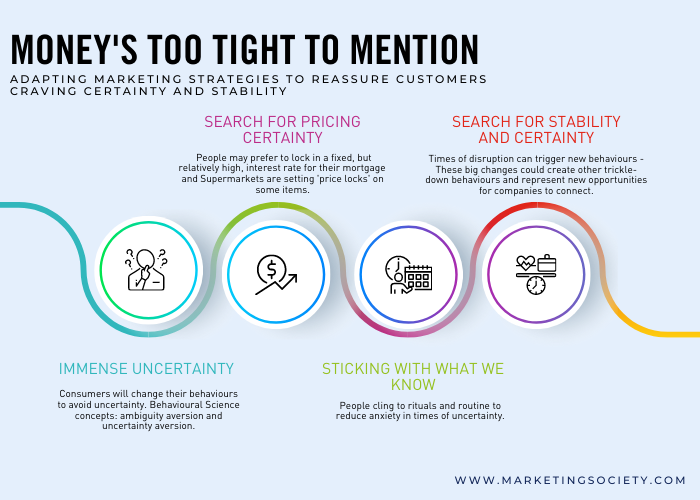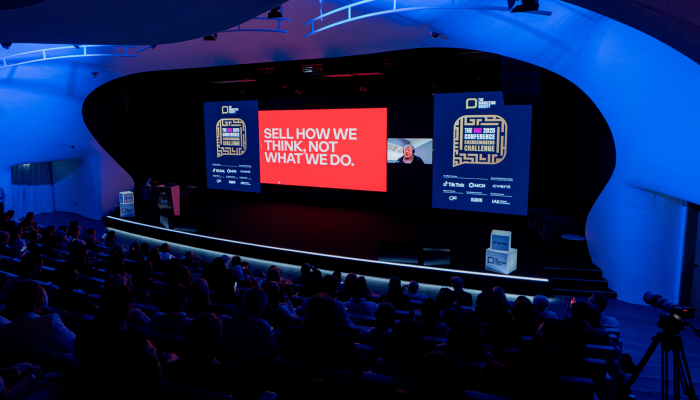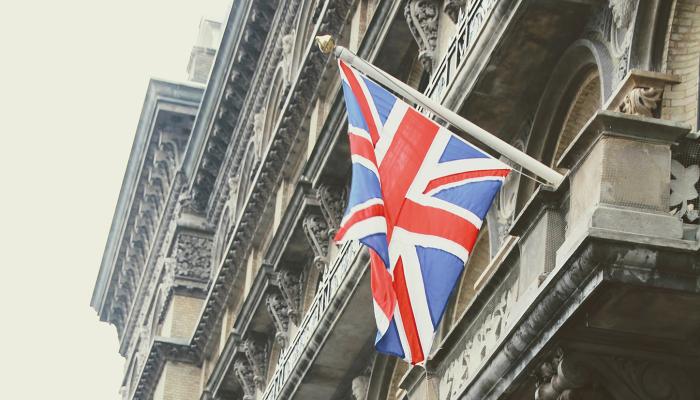The final part of our three-part series on how behavioural science can help build understanding, empathy and connection to struggling consumers in 2023, looks at how marketers can adapt strategies to reassure customers craving certainty and more stability.
It’s a simple truth that human beings dislike uncertainty and change, and cling to certainty and stability. Today consumers are facing immense uncertainty and dislike uncertainty. We dislike it so much in fact, that we will change our behaviour to avoid it, seeking out certainty and situations we can control, even if it makes us worse off. Of course, this is a generalisation and there will always be some who are better at coping with it than others, but most people fear the unknown and prefer knowns to unknowns in most situations.
Behavioural Science concepts like ambiguity aversion and uncertainty aversion - the tendency to favour the known over the unknown - help explain this intense dislike. We prefer predictable contexts which are stable and known. Hence the idiom ‘Better the devil you know’. When there is a possibility of a number of unpredictable scenarios, it’s impossible to be prepared or in control, so we feel anxious and worried.
Consumer Coping Strategies:
- We are seeing people search for pricing certainty - so they can feel in control. In the cost of living crisis, this tendency to seek out certainty is evident in a few areas - energy, mortgages, grocery shopping. People may prefer to lock in a fixed, but relatively high, interest rate for their mortgage so they can plan and budget, rather than risking a variable interest rate. In fact, the number of re-mortgaging approvals increased from 460,462 to 539,528 between 2021 and 2022 – an annual rise of 17.2% suggesting that people re-mortgaged earlier than they would have done for some certainty in future mortgage costs. Forced installation of prepayment meters have had a bad press recently, but in our research, households who used them said that despite the higher tariff they’d prefer to stay on them as they gave them more control and predictability over their energy spending. They may become even more appealing now that the government want to bring prepayment tariffs in line with direct debit charges. Many retailers are trying to build in certainty for customers. Supermarkets are setting 'price locks' on some items, meaning prices of marked products won’t go up for several weeks from each cycle. This helps dial down the uncertainty in the medium term by allowing people to plan and budget. A few well known supermarkets already had price locks in place, but more retailers have followed suit. Tesco and Sainsbury’s have 1000 items price locked. Asda, Morrisons and M&S also have similar schemes.
- Evidence suggests that in times of uncertainty we stick with what we know and what makes us feel safe. People may cling to the familiar even more than usual in order to maintain some feeling of stability and predictability. Some producers have reported consumers sticking to tried-and-tested products and being less adventurous. One jam producer said they had delisted some more niche flavours as a result. Research has found people cling to rituals and routine to reduce anxiety in times of uncertainty. If we delve into the science we find that in times of stress habits are often our friend. That’s because stress pushes our conscious reasoning and decision-making ability - our executive control or ‘System 2’ - to the back seat, allowing tried and tested unconscious habits to come to the fore. Evolutionarily, this was to our advantage. As Professor Wendy Wood says, “With a habit, you are never left without a response, even when stress, distraction or mental tiredness is derailing your conscious mind.” Therefore, people may be reluctant to change their habits and lifestyles significantly unless they absolutely have to, a reluctance which brands may be able to leverage.
- The search for stability and certainty can sometimes drive new behaviours. Times of disruption can trigger new behaviours. After all, we are nothing if not irrational beings. For those with some spare cash, the energy and fuel crisis have actually acted as tipping points, encouraging people to invest in new technologies which could help to reduce their living costs in the long term. The fuel crisis has helped to encourage switches to electric cars. Electric vehicles now have a 17% share of the UK's new car market, a figure that has grown from around 11% in 2021. December 2022 saw 53% more new electric car registrations than the same month the previous year. Solar panel installations are up too. By August last year, new solar panel installations had surpassed the total for the whole of 2021 by 30%. Other new behaviours may be born out of the need to save money. Many young people have returned to live with their parents as it is too costly to live independently. This may change social dynamics in the future, possibly further delaying life stages such as buying a first home or getting married. There is also anecdotal evidence that people are choosing to walk to work rather than drive or use public transport to save money spent on fuel and tickets. The crisis has driven the middle classes into the more budget supermarkets and yellow sticker aisles. A recent survey found that 57% of UK consumers said they would opt for a budget supermarket. One in five people said they were buying premium ‘home cook’ meals instead of eating out, and others said they were cooking differently, such as doing batch cooking to limit oven use, or cooking ‘fakeaways’ rather than buying their traditional takeaways. These big behavioural changes could create other trickle down behaviours and represent new opportunities for companies to connect.

Ideas and opportunities to build empathy, connection and support
How can you offer consumers more certainty or stability? Are there ways to give more certainty around pricing? E.g. commitments to keep prices unchanged or give advance warning of price rises.
Can you play to the familiar, given that people often cling to what they know?
Is there an opportunity to drive new consumer behaviours or leverage ripple effects from new behaviours?
This is the end of a three-part series. Read part one and part two and comment over on our member only digital Coffeehouse on Guild . We'd love to know your takeaways.
Written by Crawford Hollingworth, Liz Barker, Lucy Pilling and Katinka Duewel - The Behavioural Architects



